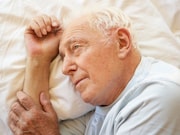
MONDAY, Nov. 26, 2018 — The death of a spouse can understandably bring sleepless nights. Now, research suggests those sleep troubles raise the odds of immune system dysfunction — which in turn can trigger chronic inflammation.
For the surviving spouse, that could mean an increased risk for heart disease and cancer, though the study did not prove a cause-and-effect link.
“We think these individuals are more vulnerable to the negative effects of poor sleep,” said corresponding author Diana Chirinos. She’s a research assistant professor of preventive medicine at Northwestern University Feinberg School of Medicine in Chicago.
The study included 101 people, average age 67. Half had recently lost a spouse, while the other half were married or single.
Researchers found that the association between sleep disturbances and inflammation was two to three times higher in the grieving spouses, according to the study published recently in the journal Psychosomatic Medicine.
“The death of a spouse is an acutely stressful event, and they have to adapt to living without the support of the spouse,” Chirinos said. “Add sleep disturbance to their already stressful situation, and you double the stressor. As a result, their immune system is more overactivated.”
Grieving spouses are at increased risk of developing heart disease or dying within a year of their partner’s death, the researchers noted.
“We already knew bereaved people had higher inflammation and a higher risk for heart disease and dying within a year of the spouse’s death,” Chirinos said. “But what was causing it? Was it the grief or sadness itself, loneliness or sleep? Now we know it’s not the grief itself; it is the sleep disturbance that arises from that grief.”
The main sleep problem associated with an overactivated immune system was poor sleep efficiency, which can include insomnia, early waking or difficulty falling asleep.
For bereaved people, the study highlights the importance of treating sleep problems, Chirinos said, adding that doctors need to ask patients about their sleep after a spouse dies.
More information
Mental Health America has more on bereavement and grief.

© 2018 HealthDay. All rights reserved.
Posted: November 2018
